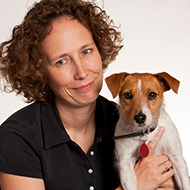
Professor Harriet Syme named winner of Petplan Charitable Trust Scientific Award 2020.
Royal Veterinary College (RVC) Professor Harriet Syme has won a prestigious award for her outstanding contributions to veterinary research.
Professor Syme was named winner of the Petplan Charitable Trust Scientific Award 2020, which honours the work carried out by organisations and individuals to further the health and welfare of companion animals. The award is presented annually to a scientist, selected from nominations submitted by the UK's eight veterinary schools and the Animal Health Trust (AHT).
Professor Syme's research concentrates on the pathophysiology and epidemiology of feline hyperthyroidism and the endocrinological diseases that lead to hypertension in cats. Hypertension and hyperthyroidism are common conditions that particularly affect older cats, and Dr Syme's work has advanced clinical practice in their diagnosis and management.
Professor Syme has also made contributions to RVC's research into feline chronic kidney disease and the endocrinology of bone mineral disturbances associated with this common feline medical condition.
Commenting on her award, Professor Syme said: “I am thrilled to receive this award. It is made particularly special by the fact I was nominated by my peers.
“It is important to emphasise though that research is a team effort, and I am just one of many people, vets and nurses alike, working together at the RVC to try to further our understanding of the diseases that old cats get so that we can improve their quality of life.”
RVC vice-principal for research and innovation, Professor Jonathan Elliott, said: “We are delighted that Professor Syme has won this prestigious award. Her research has made such a difference to the diagnosis, treatment, and long-term monitoring of common medical problems in both dogs and cats.
“On top of this, she is also a great inspiration to her colleagues and students, particularly those who have benefitted from her mentoring and supervision over the years, many of whom are now winning research funding and leading their own research projects from clinically active posts in veterinary schools.”
Image (C) RVC.



 The Veterinary Medicines Directorate (VMD) is inviting applications from veterinary students to attend a one-week extramural studies (EMS) placement in July 2026.
The Veterinary Medicines Directorate (VMD) is inviting applications from veterinary students to attend a one-week extramural studies (EMS) placement in July 2026.